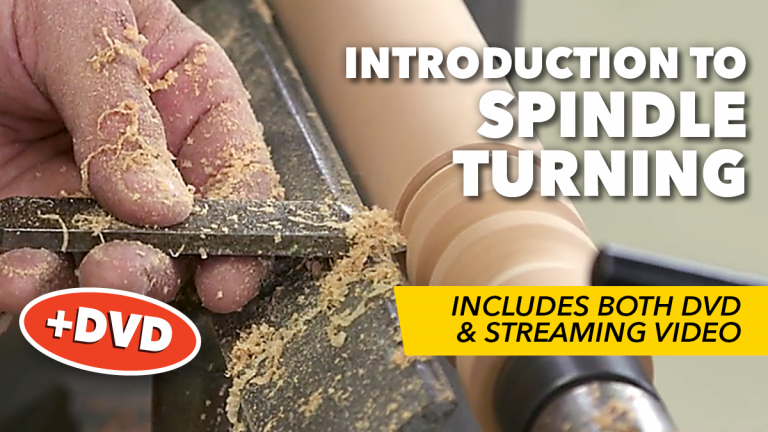
- 2x
- 1.75x
- 1.5x
- 1.25x
- 1x, selected
- 0.75x
- 0.5x
- Chapters
- descriptions off, selected
- captions settings, opens captions settings dialog
- captions off, selected
This is a modal window.
Beginning of dialog window. Escape will cancel and close the window.
End of dialog window.
This is a modal window. This modal can be closed by pressing the Escape key or activating the close button.
Introduction to Spindle Turning Class + DVD
$49.99
$10.00
At a Glance:
- In-depth Instruction; over 84 mins
- On-demand video access anytime
- Bonus downloadable PDF resources
- Access to class Q&A
Description
Description
If you want to get hooked on a hobby fast, start lathe turning!
It’s an incredibly addictive form of woodworking. It’s a lot of fun and, unlike many other types of woodworking, many lathe projects can be completed in a very short amount of time. Additionally, lathes take up very little space, and are a great way to get kids interested in woodworking.
Presented by George Vondriska, this video instruction class provides everything you need to know to start doing spindle turning. From teaching you the parts of a lathe, to what types of material are best for turning, to chisel use, we’ve got you covered. In addition to helping you with the mechanics of using the chisels, we’ll even teach you how to sharpen them.
This course concentrates on the scraping technique. You’ll learn what chisels to use for each step of the turning process, how to take a turning blank from rough to round, when to make speed changes as you’re doing your turning, and how to shape the spindle with beads and coves. We also cover sanding and finishing on the lathe, and provide a variety of safety tips.
A real benefit to learning lathe turning by video is the ability to stop and view segments multiple times. This is a great way to get a feel for the body mechanics required; how to stand, how to hold the chisel, how to make the cuts. You’ll also learn how to add accents to your turning using a burn technique, and how to turn parts to a specific size.
In addition to the detailed video instruction you’ll receive, this class provides you with a printable Class Guide you can follow and use as a reminder for the key points of the class.
NOTE: You’ll receive this Class video instruction in two forms: As on-demand streaming video (in your WWGOA Account); and as a physical DVD, mailed to you.
Class Sessions

As you work through the class, it will be important that you understand the jargon that’s specific to lathes and spindle turning. We’ll cover the parts of a lathe, and what you need to know to make sure that, if you buy lathe accessories, they’ll work with your machine. We’ll also cover various types of speed controls you may find on lathes, which is very helpful if you’re lathe shopping.

As you get ready to turn, choosing the correct chisel for the task will be critical. Gouges, skews, parting tools… they all have a place, but are not interchangeable. You’ll also learn about the differences between tool steel and high-speed steel, and how this affects your chisels.
Perhaps most importantly, you’ll see a variety of methods for sharpening lathe chisels, so you can choose the approach that works best for you and your shop.

What types of wood are good for spindle turning? Can blanks be glued up, or do you have to look for pieces large enough for the spindle you want to turn? What type of prep work do spindle blanks require in order to be safely turned on the lathe? These questions, and more, will be answered.

Speed, the rpm (revolutions per minute) you run the lathe at, is critical. Too slow, and it’s hard to get a good surface finish on your turning. Too fast, and turning becomes very dangerous. We provide a speed chart for you that breaks this down, and you’ll see how to properly and safely mount a spindle blank on the lathe.

Roughing, shaping, sanding, finishing… these are the steps required in lathe turning. Shaping is the most fun, involving getting a perfect cylinder, making beads, cutting coves, and turning to a specific diameter with the help of calipers. When to use a gouge, skew, or parting tool for these operations is key. We’ll explain tool use, show you how to properly hold the chisels, and how to manipulate them to shape the spindle.

Your Instructor
George Vondriska
George Vondriska is the Editor in Chief here at Woodworkers Guild of America and has been sharing his woodworking expertise since 1986. Apart from conducting classes at his renowned Vondriska Woodworks School, George's passion for teaching has taken him to woodworking shows nationwide and has led him to teach woodworking for prestigious organizations such as Peace Corps/Swaziland, Andersen Window, Northwest Airlines, and the Pentagon. With a wealth of published magazine articles under his belt, encompassing tool reviews and shop improvement projects, George's knowledge and skills continue to inspire woodworkers every day. To discover more about him and his school, visit georgevondriska.com.

Bonus Material
Printable Class Guide PDF
Download and print this PDF Guide to complement your Class. It’s a good resource for key lathe techniques.
Class Resources PDF
See this list of products and reference information related to this Class; includes a Speed Chart.
Video: Meet Your Instructor
Download this short video to meet your class instructor, George Vondriska.
Video: More about Spindle Turning
Download this short video to hear George talk about the fun, creativity and possibilities with a lathe.
Bonus Materials available for download after purchase.